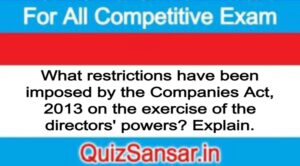
What restrictions have been imposed by the Companies Act, 2013 on the exercise of the directors’ powers? Explain.
What restrictions have been imposed by the Companies Act, 2013 on the exercise of the directors’ powers? Explain.
Or
Discuss the powers, duties and liabilities of directors of a company.
Or
How can the liability of director of a company with limited liability be made on limited?
Ans.
LIABILITIES OF DIRECTORS
The directors should act intra-vires i.e. within the limit specified given in memorandum. He should be bonafide and take all reasonable care in performing his duties. If he acts in this he will not be personally liable, after he will be held responsible in the following manner:
(1) Liability towards Company: These are as under –
(a) For Breach of Trust: If they use company’s fund for their personal use and make profits.
(b) For Dishonest Acts: If they purchase assets in their own name and then selling it to company at a higher price.
(c) For Gross Negligence: Negligence in performance of their duties e.g. delegation of power when the articles do not permit or paying dividends when these are no profits.
(d) For Ultra-vires Act: If the directors are ultra-vires to the memorandum or ultra-vires their powers.
(e) For Willful Misconduct: If they misappropriate company’s assets willfully.
(f) For the Acts of his Co-directors: If they absent himself from the Board meeting.
(2) Liable to Third Parties: For the following acts the directors shall be personally liable.
(a) Acting in their Own Name: If any director contracts in his own name, he shall be personally liable if compensation is claimed by third parties.
(b) For Ultra-vires Act: If they act or enter into a contract which is ultra-vires the company or Ultra-vires their powers.
(c) Where the liability of directors is made unlimited by a provision in the Memorandum.
(d) Liable to refund Excess Amount Received for Allotment: If shares are not alloted within 120 days from the date of issuance of prospectus, the amount is to be refund to the applicants.
(e) Liable for Mis-statement in Prospectus : If due to mis-statement in prospectus, the investors, share holders, have to suffer losses they may held directors liable to compensations.
(f) Liable to Agent: They are liable to the third person in the same way as agent is responsible while conducting the work of agency.
(g) Not Applying in the Approved Stock Exchange: If it is given in prospectus that the shares be listed in approved stock exchange for sale and purchase and it is not listed then it is the responsibility of the company to refund the money. If it is not refunded their directors be responsible for it.
CRIMINAL LIABILITY
They incurred criminal liability for fraud and non-compliance of various provisions of the. Act:
(a) Section 34: For Misstatement or fraudulent in the Prospectus shall by liable Under Section 447.
(b) Section 36- If any director commits a guilty of knowingly or recklessly any fate, deceptive or misleading statement, promise or forecast, shall be liable for action U/s 447.
(c) Section 127- When the company has declared the dividend, but has not been paid within 30 days, the defaulting directors shall be punishable with simple imprisonment for a term of two years and shall be liable for fine of 1000 rupees for every day.
(d) Section 129- If there is a default in presenting the b/s and P and L A/c in the general meeting, the directors shall be punishable with fine pot less than fifty thousand rupees and may be extended to three lakh rupees.
Section 165 and 184 also provide for director’s criminal liability.
POWERS OF DIRECTORS
The power of directors are classified in two parts:
(1) General powers (II) Special powers
(1) General Powers (Section 179): The Board shall be entitled to exercise all such powers as the company is authorized to exercise. The powers of the Board are co-extensive with the MOA, AOA and the company itself.
These powers are subject to some restrictions.
(II) Special Powers (Section 179): Following are special powers of directors –
1. The powers to fill up causal vacancies among directors.
2. The power to appoint the first auditors.
3. Power to dispose off the shares available for issue in order to increase the subscribe capital.
4. Power to exercise superintendence, control and directions over the affairs of the company.
5. Power to appoint additional directors,
6. Power to appoint alternate director,
7. Power to contribute in National Defence Fund for the purposes of national defence.
RESTRICTIONS ON THE POWERS OF DIRECTORS
[SECTION 180]
The Board of Directors cannot exercise any of the following powers without the consent of the company in general meeting:
(a) Sell, lease or otherwise dispose off the whole or substantially the whole undertaking.
(b) Invest otherwise than in trust securities the amount of compensation received by the company as a result of merger.
(c) Borrowing of the money where the merges already borrowed exceeds the paid up share capital.
Other Restrictions:
1. Restrictions Over Donations for Political Activities [Section 182] : Donations for political purposes are fully restricted. The donations given in any financial year should not exceed 7.5% of the average net profits of the three years preceding the financial year in question.
2. Contribution to National Defence Fund [Section 183]: The Directors can make donations to above fund, to the amount it thinks fit.
DUTIES OF A DIRECTOR OF A COMPANY
Following are the duties of a director of the company:
1. Duties according to Articles of Association: Directors are bound to do such duties which are provided in the Articles of Association.
2. Duties According to the Companies Act: According to the Companies Act following are the duties of a director:
(i) to disclose his interest,
(ii) to disclose his shares for himself,
(iii) to examine the truth of prospectus,
(iv) to make signature on the prospectus,
(v) to file declaration to receive certificate of commencement of business,
(vi) to make signature on annual statement,
(vii) to declare divided,
(viii) to produce annual accounts,
(ix) to file report regarding company,
3. Duties According to Decisions of the Court: Duty to work honestly, efficiently, delightly and consciously.
- What is meant by Database Management System?
- Discuss the advantages and drawbacks of database.
- What do you mean by database ? Discuss its Characteristics.
- What is Data Mining?
- What are the conditions of communication?
- What do you mean by business communication ?
- organization / Differentiate between classical and modern theory of organization
- What is forecasting






